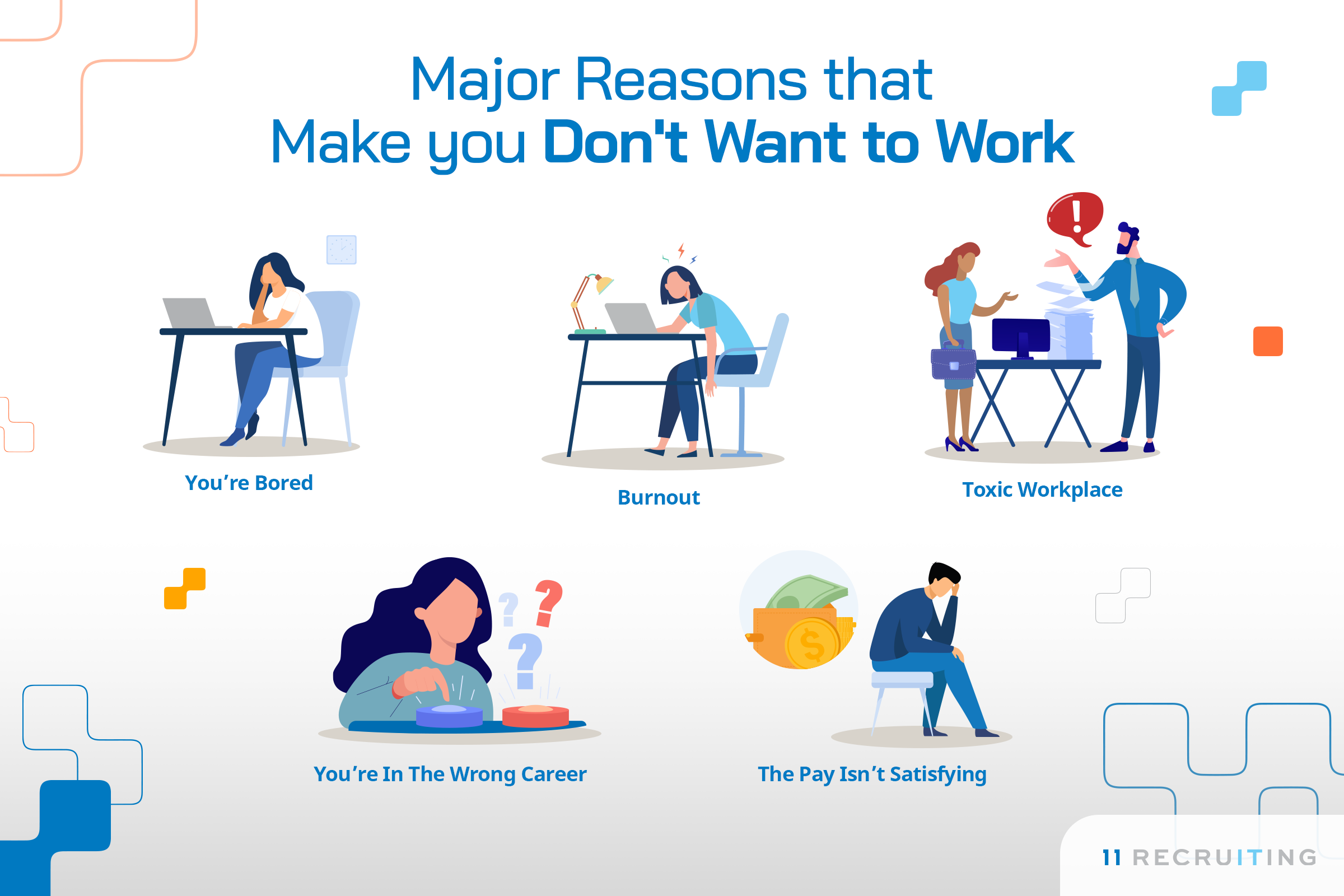
You wake up, you feel relaxed, and without a care in the world. But then, you realize – Oh no! I have to go to work. And I don’t want to work anymore.
If you find yourself scheming different ways to kill your boss or wanting lengthy vacations, you’re not alone. According to several polls, around (50%-85%) of people are unenthusiastic about their job.
Major Reasons that Make you Say “I Don’t Want to Work”

1. You’re Bored
Are you someone who’s in the same tedious job for years? Or maybe you’re someone who just started their first week on a new job but are already daydreaming about other things. In either case, don’t jump ahead and say “I don’t want to work.” it’s just a sign you need to re-evaluate the trajectory of your work life.
Ask yourself these questions: Is there something I could do to make this job more enjoyable? What makes my job boring? Is it the lack of challenges? Am I unfit for this job? Could it be that I actually hate what I’m doing?
Sometimes , our job can also be too routined or easy, and we’re left with more downtime than we know what to do with. Either case can lead you to feel bored, unsatisfied and say I don’t want to work.
How to not be bored at your job:
- Talk to your boss – Let’s start with the hardest one – tell your boss you’re bored! Okay, maybe don’t phrase it that way. But tell them you feel that work is getting monotonous and you’re looking for something more exciting or challenging. Maybe ask them for a change in role or responsibility.
- Take a break – Taking a gap year or a holiday might help you reclaim any passion for your job that you once had.
- Mix things up – Find ways to make a dull job interesting. For example, if your responsibility is to input data in an Excel sheet, time yourself and try to beat your previous record. Try finding more efficient/creative ways of entering data. The key is to be interested enough to keep your mind engaged.
2. Burnout
Another significant reason for not wanting to work might be burnout. Maybe your boss is a little too demanding and makes you frequently work overtime. It could also be the case that your job is too taxing and consumes a significant amount of cognitive/physical energy. Maybe you aren’t being appreciated enough for your hard work. All this can lead to severe burnout.
How to Deal With Burnout?
- Start a meditation practice – A meditation practice can help calm things for you and help ride through your burnout phase without getting, well…burnt out.
- Talk to a friend – Try talking to a compassionate friend who will listen to you. Speaking to the right people can help release stress.
- Do something interesting outside of work – Try to find other things in life to engage yourself with. Start a new hobby. Go on a crazy adventure. Begin that new project you’ve been procrastinating on (as long as the project is enjoyable and doesn’t lead to more burnout of course).
- Take a gap year – If you feel burnout or depressed, take a gap year to refresh yourself. After the break, you can then decide whether you want to work in the same company or whether to go on a job hunt.
3. Toxic Workplace
A toxic workplace may contribute significantly to how uninterested you feel in your job. Having a boss micromanage you or shout at you can affect your mental health, which then causes you to shut down and lose interest in work.
Not all bosses are necessarily evil overlords – sometimes toxic workplaces stem from a toxic culture, and your boss is as trapped in it as you are. That feeling of “I don’t want to work” often stems from a challenging workplace.
Unless you’re someone with a lot of say in the company, you can’t change the culture nor the people in the workplace. Your boss will continue to remain a pain in your behind. Open your CV, start working on it, and submit it to better employers to get out of the hell you’re currently in.
Now, if you have no choice but to stay in the company, you’ll have to learn to deal with the stress. One of the best ways to do so is mindfulness. You’ll also have to learn to confront your bosses and co-workers from time to time so that they don’t step on your boundaries. And as much as you can, stay away from negative people.
4. You’re In The Wrong Career
This could be the hardest pill to swallow, but maybe you say “I don’t want to work” so often because you’re in the wrong job. Here are some classic signs you’ve made a boo-boo with your career choices:
- You continuously daydream about other careers.
- Getting professional education feels tedious.
- You’ve been slacking off in different areas of your work.
- Other people tell you you’re great at another skill unrelated to your current job.
- You spend your work hours thinking about hobbies and interests unrelated to your present job.
What to do if you’re in the wrong career:
- Figure out what you’re interested in and what you’re good at – Maybe you’re an accountant, but people keep telling you how great you are at persuasion and communication. Maybe you’ve always been fascinated by marketing ads. It could be a good sign that you’re a secret marketing and sales whiz and you should probably start a job hunt in those fields.
- Internships – Internships are a fantastic way to try out a job without committing to it for the long run. Think of them just like a casual relationship, if you’re bored, you can leave, but if you’re interested, you can put a ring on it!
- Seek Professional Help – There are plenty of career guidance companies all over the world. Do some research and figure out the best ones for you.
- Research – While it’s a good idea to get professional help, it’s also a smart idea to do some research yourself. Look into areas you’re interested in, figure out the roles and responsibilities in that job, and see if it interests you. If any of them sound appealing you could always try out an internship to test the waters.
5. The Pay Isn’t Satisfying
Now you may be one of the lucky few who are doing what they love. But there’s just one problem. Your company pays you peanuts. Sooner or later you’ll hear yourself say “I don’t want to work anymore”, and that’s a spiral you don’t want to go to.
Here’s what to do if you’re stuck with peanut-pay:
- Negotiate your salary – Feel you’re being paid less than the market rate? Then negotiate with your employer to bump up your paycheck. Highlight your achievements and contributions to them to substantiate your side of the claim.
- Look for another job – If your employers don’t want to increase your pay, maybe it’s time to bid goodbye. Look for a job somewhere else.
Which brings us to our next point…
How To Find Your Ideal Employer?
Let’s say you know exactly what job you want to get into, and you’re on a job hunt. But you’re finding it difficult to get work through LinkedIn and job boards.
It’s in these cases that recruitment agencies become excellent options. (Good) recruiting agencies will help match you with your ideal job – they are partnered with many companies and are intimately aware of their details like salaries offered, job roles & responsibilities, company culture, and more. Now, you won’t have to say “I don’t want to work.” The more reputed the agency, the higher the chances you can find your dream job. You can find your ideal job by going to a reputed agency.
Recruitment agencies also prepare you for the interviews, help you write a solid resume, educate you on the job and market, answer questions and doubts, and more. If you’re thinking of going the recruiter route, check out our agency Eleven Recruiting.
Frequently Asked Questions
How Do I Live Without a Job?
It’s possible to live without a job, but only temporarily. Some ways to do this are controlling your expenses, establishing other streams of income, and saving up for an emergency fund. Find a good recruiting agency near you or online – oftentimes they can help you get a job that fits your experience level and skill set.
How Do I Find What My Passion Is?
There are plenty of ways to find your passion. You may brainstorm a variety of interests, explore different careers, reflect on the things that interest you in life, and in general follow your heart and its desires. For example, if you love modding video games, you’d be a great candidate for a company hiring a level designer
Is 35 Too Old To Start a New Career?
No, 35 is not too old to start a new career. You also don’t need to go to a school and get a new degree to change careers – there are plenty of online programs and certifications that help you master new skills in a short amount of time.

